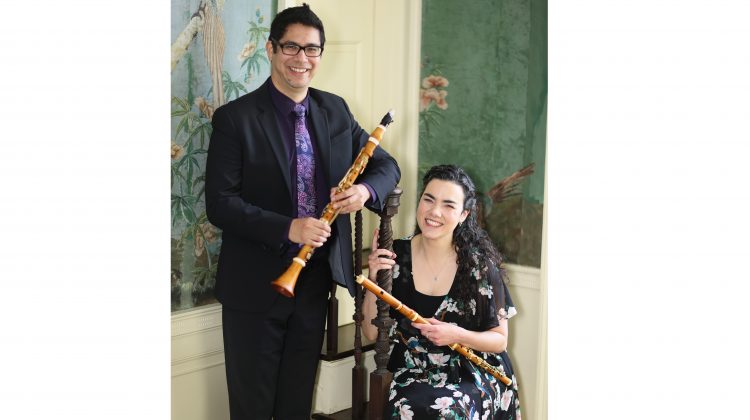PEABODY — The Arpeggione Ensemble, music has never been just about sound. On Saturday, May 10, the innovative chamber group will bring their newest project, Brushstrokes, to the Peabody Black Box Theater at ArcWorks Community Art Center, offering an immersive, multi-sensory performance that reimagines how music can be experienced, especially by Deaf and hard-of-hearing audiences.
The performance, which begins at 4 p.m., blends live painting, chamber music on historical instruments, American Sign Language (ASL) performance, and real-time improvisation. The event was developed in partnership with the Children’s Center for Communication/Beverly School for the Deaf and is supported by funding from the Peabody Cultural Council, the Massachusetts Cultural Council, the Institution for Savings, and a Creative County Initiative grant through the Essex County Community Foundation.
From the outset, Arpeggione’s co-founders, clarinetist Thomas Carroll and flutist Andrea LeBlanc, envisioned their group as a platform for accessibility, creativity, and connection. “We really believe that music is a universal emotional language,” LeBlanc said. “Our job is to include as many people, and as many perspectives, as possible.”
Brushstrokes is the culmination of a vision Carroll and LeBlanc first discussed three years ago: to create a Deaf-inclusive performance that bridges sound and sight. After extensive collaboration with Beverly School for the Deaf, the project took shape. LeBlanc said the experience “exceeded all our wildest expectations,” praising the school’s leadership for helping the ensemble expand its understanding of accessibility and inclusion.
The performance opens with Deaf, Indigenous artist Nancy Rourke creating a live painting on stage. As she paints, the musicians of Arpeggione will respond through “Soundpainting,” a system of improvised music-making based on gestures inspired by ASL. Carroll will direct the ensemble’s musical responses in real time, shaping the sounds to mirror the energy, direction, and emotion of Rourke’s artwork.
“Thomas will be interpreting what Nancy is painting,” LeBlanc explained. “If she makes broad strokes, the music might swell. If she dots the canvas, the sounds might become staccato and quick. It’s about creating an artistic conversation between mediums.”
From there, the concert transitions into more familiar repertoire — chamber arrangements of Mozart’s Clarinet Concerto and Haydn’s Symphony No. 104 — but with a twist. During Mozart’s concerto, hearing artist and clarinetist Stephen Bates, a synesthete who associates colors with sound, will create a second live painting inspired by the music. During Haydn’s symphony, artwork by students from the Beverly School for the Deaf will be projected in a continuous slideshow, weaving their creative voices into the fabric of the event.
Accessibility remains at the forefront throughout the concert. ASL interpreters will perform live, signing representations of the music to ensure that Deaf and hard-of-hearing attendees can fully engage with the experience.
For Carroll, the concert represents more than artistic experimentation — it embodies Arpeggione’s deeper mission. “We want audiences who are used to chamber music concerts to see another facet of what it means to interact with art and music,” he said. “It’s about expanding how we experience the world.”
Carroll will perform Mozart’s beloved Clarinet Concerto on a replica basset clarinet he crafted himself, modeled after the now-lost instrument played by Anton Stadler, the clarinetist for whom Mozart originally composed the work. A historical instrument specialist, Carroll meticulously reconstructs these rare clarinets using 18th-century designs, crafting each piece by hand. “It’s a labor of love,” he said, “bringing these instruments back to life so audiences can hear the music the way it was originally intended.”
Both Carroll and LeBlanc emphasized outreach performances, not ticketed concerts, from the heart of Arpeggione’s work. They regularly perform in senior centers, libraries, and community venues across the North Shore, designing each program to reach audiences often underserved by traditional classical music institutions.
“Accessibility isn’t an afterthought for us — it’s the center,” LeBlanc said. “Brushstrokes is just the beginning of a larger series of accessible programs we plan to create.”
Founded officially in 2022, Arpeggione Ensemble has already carved out a unique space in the local arts community, known for blending historical performance with contemporary relevance. The group is BIPOC- and woman-led and remains deeply committed to supporting the broader creative economy by collaborating with local artists across disciplines.
For both Deaf and hearing audiences, Brushstrokes offers a rare opportunity to experience music in a new way — to feel it, see it, and connect with it beyond sound alone.
“Music is not just what we hear,” LeBlanc said. “It’s what we feel, what we imagine, what we create together.”
Tickets for the May 10 performance are available at arpeggione-ensemble.com. General admission is $35, student admission is $25, and Mass Cultural Council Card to Culture tickets are available for $5.

